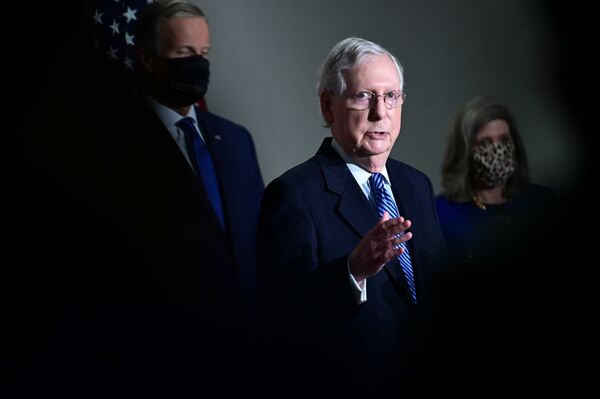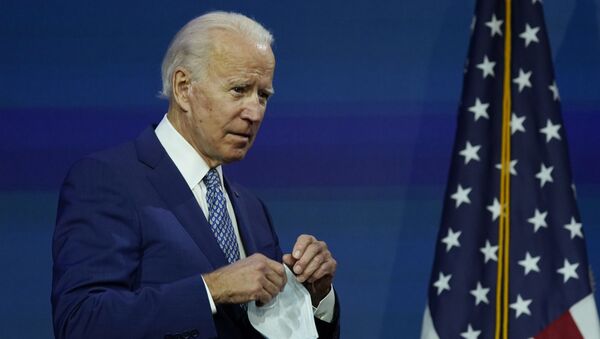The Republican Party has made it clear that it will focus again on curbing the nation’s debt starting in 2021, as the Congressional Budget Office (CBO) reported on 9 November that the federal deficit of $3.1 trillion in 2020 was "the largest as a percentage of GDP since 1945", mostly due to the Covid-19 crisis spending package. For comparison's sake, the aggregate value of all US mortgage debt is currently $10 trillion, according to Maurie Backman of The Motley Fool, writing for NASDAQ. Total US federal debt (which doesn't include state and municipal government debt) exceeds the nation's annual GDP at over $27 trillion.
“Whoever is in the White House, I hope they realise how serious the debt crisis is and how important it is that we put measures in place to address it,” said prominent Republican Senator John Thune, as quoted by The Hill.
As a result of the deficit and federal borrowing, the US federal debt held by the public mounted to 100.1% of GDP in 2020, surpassing the size of the American economy. According to the CBO, "much of that amount was the result of the economic effects of the novel coronavirus pandemic and the legislation enacted in response".
GOP Senators' Initiative May Become a Headache for Biden
Yet another angle of this story is that the GOP is bracing for the incoming Biden administration although President Donald Trump has yet to concede amid pending litigation over alleged voter fraud, according to Inquisitr.
The Republicans' refocusing on the deficit matters could indeed become a headache for ex-Vice President Joe Biden and his ambitious economic plan should he occupy the White House in January 2021, admit American observers.
"It will definitely be harder for Biden to push through his programmes for big spending on green energy if Republicans retain control of the Senate," says James Hamilton, professor of economics at the University of California at San Diego. "In general, I expect deficits to be smaller when the White House and Senate are controlled by different parties than we would see when either party has full power."
During his campaign Joe Biden announced a whole set of new economic measures which envisage the enlargement of the federal deficit, with a 10-year plan worth $5 trillion. In addition to bold infrastructural projects, Biden's strategy also includes expanded access to health care, initiatives aimed at dealing with the climate change issue, and large tax hikes.
"If the Republicans maintain their Senate majority, I expect stiff resistance from them, particularly on Joe Biden's plans to extend benefits on Medicare and Medicaid, his climate change investment plans, the tax raise for high-income earners and corporate income tax, and the defence budget cuts," believes Yannis Koutsomitis, a political and economic analyst.
It is plausible that the debate on national debt levels will gain steam as the economy grows in Q1 and Q2 and as the nation approaches the July 2021 deadline, according to him. The economic analyst points out that much will depend on Federal Reserve policies, "as any reversal of its massive quantitative easing will probably hit treasury yields and make debt refinancing a real burden for the federal government's fiscal stance".

Why GOP is Likely to Preserve Control in the Senate
The fate of the Senate majority will be determined on 5 January 2021 by two runoff elections in Georgia. Currently the Democrats are poised to have 46 seats plus two seats from independents aligned with them in January versus 50 seats held by the Republicans. If Joe Biden takes the White House and the Dems win two seats in Georgia, that could give the party control of the Senate: in a 50-50 split scenario, would-be Vice President Kamala Harris, may easily break a tie. Still, the GOP would have a filibuster option, something the Democratic Party is eager to get rid of.
While the situation appears entangled, there is no way that the Democrats will "take it all" in the US Senate, says Michael R. Englund, principal director and chief economist for Action Economics.
"The Senate is likely to remain in Republican control," the economist believes. "Even if the Democrats win the two George run-off Senate seats and get a 50-seat Senate position that is a majority with a vote from the Vice President, [Democratic] Senator Manchin from West Virginia has already stated that he would not vote to end the filibuster, so the Republicans would still be able to easily block any legislative action in the Senate."
On 9 November, Manchin asserted on Fox News that he would not vote to nix the legislative filibuster if there is a 50-50 tie in the Senate. Likewise, he vowed to oppose packing the Supreme Court with additional liberal judges by the Democratic Party and criticised "defunding the police", "Medicare for All" and "Green New Deal" initiatives.
"We've been tagged if you've got a D by your name you must be for all the crazy stuff and I'm not," Manchin stressed.
According to the National Review, the Democratic senator's vow can be trusted since he had repeatedly broken with the Dems before: to vote for Senator Tim Scott’s police reform bill and to confirm Trump nominees Brett Kavanaugh and Neil Gorsuch to the Supreme Court.

Why the 2021 US Gov't May be 'More Conservative' Than Its Predecessors
"As such, the new mix of government in 2021 is almost the same as in 2020, and is more 'conservative' in the sense that President Trump was willing to spend money to a greater degree than the Republican Senate, i.e. his spending ambitions were closer to Nancy Pelosi’s than Mitch McConnel’s," according to Englund.
The economist expects that Mitch McConnel will shift the Republican position to the right of where it was when Trump was the effective head of the Republican caucus. And this means that would-be President Biden won’t be able to get any legislation passed that isn’t approved by Mitch McConnel, especially given that the latter is now more able to take a conservative position, Englund believes.
"All of Biden’s legislative proposals were essentially 'marketing material' for the elections, and will be dead in the water with the new Congress," he suggests. "The only difference between the presidents will be what they can accomplish with executive orders, so we may see changes in immigration enforcement, tariffs, environmental protections, and verbal treaty commitments (though treaty commitments are only enforceable if passed by the Senate)."
Furthermore, "Biden will face substantial political pushback from moderates if he makes any changes, since the actions taken by Trump were more popular than Trump himself", Englund remarks, admitting nevertheless that one "will probably see changes on the margin, though, with the Paris Climate Accord, the Iran nuclear deal, and possibly some tariff levels".


